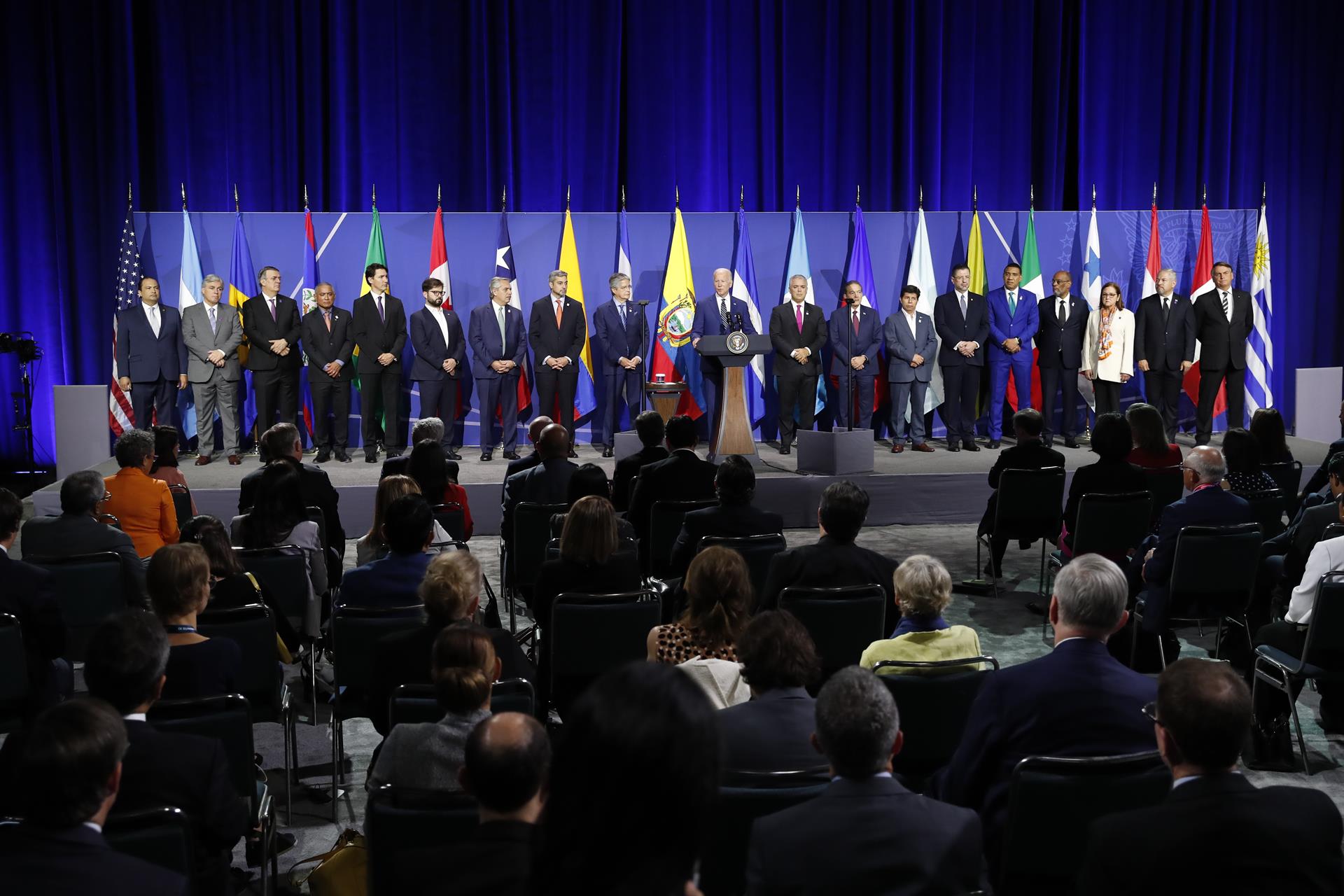Despite discrepancies, absences and discordant voices, the twenty leaders gathered at the Summit of the Americas held in Los Angeles, achieved something more than an agreement on immigration termsrecognizing the importance of defending democracy under threat and, incidentally, offering a platform to demand the release of political prisoners imprisoned by the Nicaraguan regime.
The decision of the Biden Administration, not to invite the three dictatorships of the continent, served as a pretext to justify the absence of the president of Mexico, Andrés Manuel López. Their counterparts from Bolivia and Honduras were absent in solidarity, while Guatemala and El Salvador did not participate for other reasons.
Three experts on relations between the United States and Latin America, interviewed in the program This weekagreed that the lack of a unanimous declaration in favor of democracy cannot be considered a failure.
“The countries of Latin America met in Los Angeles to make an alert call to the problems in the region, and to talk about democracy at risk. I think it was fulfilled, and this in itself is something significant,” said the adviser to the Carter Center for Latin America, Jennie Lincoln.
For the former US ambassador to Panama, John Feeley, “President Biden did an excellent job in pointing out that it is not in agreement with dictatorships, human rights abuses, or the lack of freedom in Nicaragua, Cuba and Venezuela”, highlighting that in private meetings, or in corridor conversations, and beyond declarations, speeches, and formal presentations, “democracy was discussed, the remnants of democracy in the region, both on the left and on the right ”, so he is not “so disappointed with the fact that there was no specific declaration on democracy”.
Nicaraguan Manuel Orozco, from the Inter-American Dialogue, said that the issue of dictatorships was addressed correctly at the Summit, but also that Nicaragua was at the center of the debate in civil society forums and in the plenary session of the rulers, especially when calling for the release of political prisoners.
“I think that more than that could not be achieved because this Summit was reached in a context where politics and democracy are not talking to each other, especially in Latin America, where the democratic situation is in a very worrying deterioration, with at least ten Latin American countries, without respect for the rule of law”, he graphed.
Democracy under attack
The advance, and the imposition, of authoritarian leaders -in the Americas as in Europe- highlights the Yoimportance that the leaders of the continent had made a closed defense of democracy in the region, although deep down, perhaps it is a problem of expectations.
Feeley admitted that President Donald Trump’s attempt to subvert the rule of law (which had its highest expression in the attack on the capitol of January 6, 2021), shows that “The United States is not – it has never been called – a perfect democracy. There is no perfect democracy: we always have to be for the sake of perfecting our democracies”, he invited.
That is especially true, witnessing Russia’s increased military presence on the continentand the growth of China’s diplomatic and economic influence in the region.
For Orozco, “China is a strategic commercial ally for Latin America and the Caribbean”, by virtue of the possibility of acquiring goods at low prices, which would explain why 30% of the region’s imports come from China. “That is an unnecessary instrumental alliance. Chinese investment in Latin America is limited, and now that that country is entering a very strong recessionary phase, its expansionism will be very limited”, he warned.
Regarding Russia, he said that “what we are seeing is the consequence of the loss of hegemony in regional security by the United States, where Russia has capitalized on a trilateral alliance with Cuba, Venezuela and Nicaragua, militarily destabilizing the Caribbean basin. It is not just a matter of arms: Nicaragua has been armed more than the three countries of northern Central America combined, only with Russian weapons, and the United States now has a much more complicated agenda.”
For his part, the former US ambassador in Panama recognized that his country always has the need to monitor what Russia is doing, not only in our hemisphere, but in other parts of the world, because Russia “is a government that has values different from those of many democracies.” ” of the West.
The migration agreement
If in previous summits, the great victory that the organizers of some of these continental events were able to exhibit were agreements on protection against drug trafficking, or the promotion of free trade, or in defense of freedom of expression, “this time the main agreement was that 20 countries signed an agreement on migration and that is a great win”, assured Orozco.
“The declaration on migration was important because for the first time a recognition and an agreement to create integration and a legal step for the number of immigrants”, he stressed, pointing out that “what is absent is that the main cause of migration in the last ten years has to do with the fragility of the States, or the political instability that occurs in the dictatorships of Venezuela, Cuba, or Nicaragua. ; the absence -and corruption- of the rule of law in Guatemala, El Salvador and Honduras, and the human rights violations in Mexico” that pushes many citizens to leave.
Orozco believes that signing an agreement, without mentioning the causes of migration to find root solutions to a problem that affects millions of Americans, was “a half achievement. More was achieved than expected, yes, but in the end the matter becomes a media issue.
The expert stated that there is a “relationship of love and hate between the United States and Latin America and the Caribbean”, where on the one hand there is talk of “unrequited love”, while the United States claims that Latin American countries do not comply with the rules . “There is a problem of inconsistency: the United States, on the one hand, denounces the human rights crisis in Nicaragua, but remains silent about the political situation in Honduras, and many countries resent that.”
For Lincoln, from the Carter Center, even though an agreement on migration has been signed, this issue must be debated, after the lights go out, the microphones are disconnected, and the delegations return to their homes.
Other questions that require answers are what will be the follow-up, and what are the next steps? Who is going to take the lead in moving forward to protect and strengthen democracy in those parts of the region where it is at risk? How do you go to increase effort to collaborate in terms of migration?, in addition to attending to the post-pandemic regional recovery.
The OAS and the Inter-American Democratic Charter
The Summit also highlighted the controversy over the role of the Organization of American States (OAS) and the Inter-American Democratic Charter, supposed to serve as an instrument to promote and protect the health of democracy in the hemisphere.
Orozco invited work to reform the OAS, saying that “the countries of Latin America have to take the United States more seriously, and the United States must stop thinking that Latin America is still that banana republic, because it is no longer, and think a little more about how to strengthen the commercial and political relationship with these countries”.
As an example, he suggested “taking as a challenge what he said [el presidente de El Salvador, Nayib] Bukele [que hizo suya la narrativa cubana, al llamar ‘Ministerio de Colonias’ a la entidad continental]and place it, and work based on that”.
Jennie Lincoln, of the Carter Center, believes that we must take advantage of the movement of the Summit to address key issues, such as the fragile state of democracy in Latin America, the United States and throughout the region, “and what are we going to do to take advantage of these moments and achievements of the Summit, although they may be incipient”.
Finally, former Ambassador Feeley acknowledged that he would have preferred a declaration similar to the one made in 2001, when the 34 democracies of the hemisphere urged that the Inter-American Democratic Charter be drawn up, but “we are living in different times, and we have to play with the cards that one has in the deck and not with the cards one would like to have”.
















